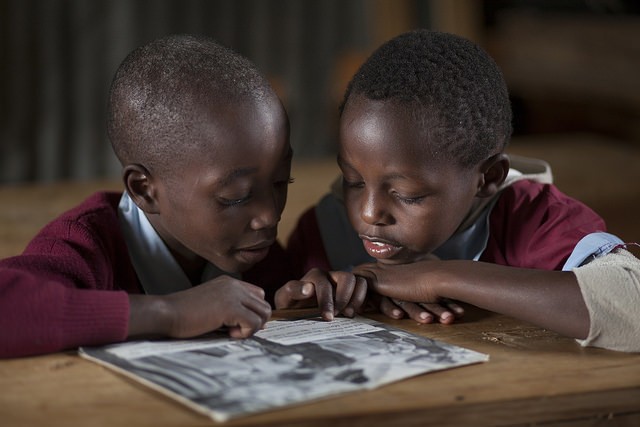
Overview
As the responsibility for leadership passes to the next generation, Africa’s future and its global competitiveness will be driven by academically gifted and entrepreneurial young people empowered to lead. USAID is providing state of the art education to millions of Kenyan children, expanding educational and employment opportunities for young adults, and preparing a new generation of young African leaders with the skills and mindset to transform the region and the continent.
Program Areas
Early-Grade Reading
Reading is a fundamental skill that lays the foundation for all future learning. After rigorous piloting and broad national buy-in from a range of key stakeholders, USAID and the Ministry of Education (MOE) are implementing a national reading program in every primary school in Kenya. The USAID/MOE partnership, known nationally as Tusome (“Let’s Read” in Kiswahili), delivers state of the art instructional methodology and a teacher training program that is building the capacity of Kenya’s cadre of teachers and dramatically improving reading skills of over five million learners throughout the country. Teachers and learners are utilizing nearly 20 million new Tusome textbooks and learning materials that are reviewed and updated on an annual basis. To monitor progress and adjust programmatic approaches on the ground, Tusome has implemented a game-changing electronic monitoring and evaluation system that gives real time data and instructional feedback to teachers and administrators throughout the country. In sum, the technical interventions and the larger Tusome literacy program are producing a new generation of primary school students reading at international standards of fluency. The program is hailed as an Agency model of scale and sustainability that is built upon deep partnerships, local solutions and a tangible return on investment.
Access to education
Extensive public private partnerships drive the USAID Global Give Back Circle and Wings to Fly activities. These programs empower high-achieving yet impoverished students to continue their education and realize their potential through scholarships, training and mentoring. In addition, the DREAMS Initiative, supported by the President’s Emergency Plan for AIDS Relief (PEPFAR), is helping young women reduce their risk of HIV infection and expand their access to education, health services and livelihoods in target counties.
Youth employment
In Kenya, some 2.5 million young people are unemployed, and only five percent enter the formal workforce each year. USAID is helping a new generation of young people make the transition from education to employment and successfully compete for jobs in the economy.
Generation Kenya, a youth workforce development program, teams up with employers to identify skills gaps in target industries and customize job training programs for young people. To date, nearly every Generation graduate has secured employment in their target industry, thus meeting the needs of both unemployed youth and the emerging job market.
The Kenya Youth Employment and Skills (K-YES) activity brings together public and private sector leaders to solve Kenya’s youth employment challenge and spur local and national economic growth. K-YES connects young people with market-relevant training that translates into jobs.
Youth leadership
The Young African Leaders Initiative (YALI) supports young people to drive growth and prosperity, strengthen democratic governance, and enhance peace and security across Africa. There are three programs under the initiative in Kenya and East Africa:
- The Mandela Washington Fellowship provides skills and support for young African leaders through training and coursework at 40 U.S. universities. Thousands of young africans have brought their experience back home to make a difference and lead a new generation.
- The Regional Leadership Center for East Africa in Nairobi, Kenya has trained thousands of young leaders from 14 East and Central African countries in business and entrepreneurship, civic leadership, and public management.
- The YALI Network provides online courses and a forum to equip young leaders with 21st century skills to transform their communities. The network includes 500,000 members continent-wide.








Comment
Make a general inquiry or suggest an improvement.